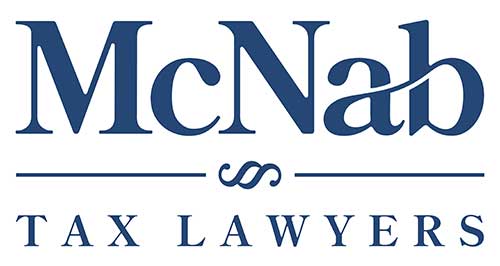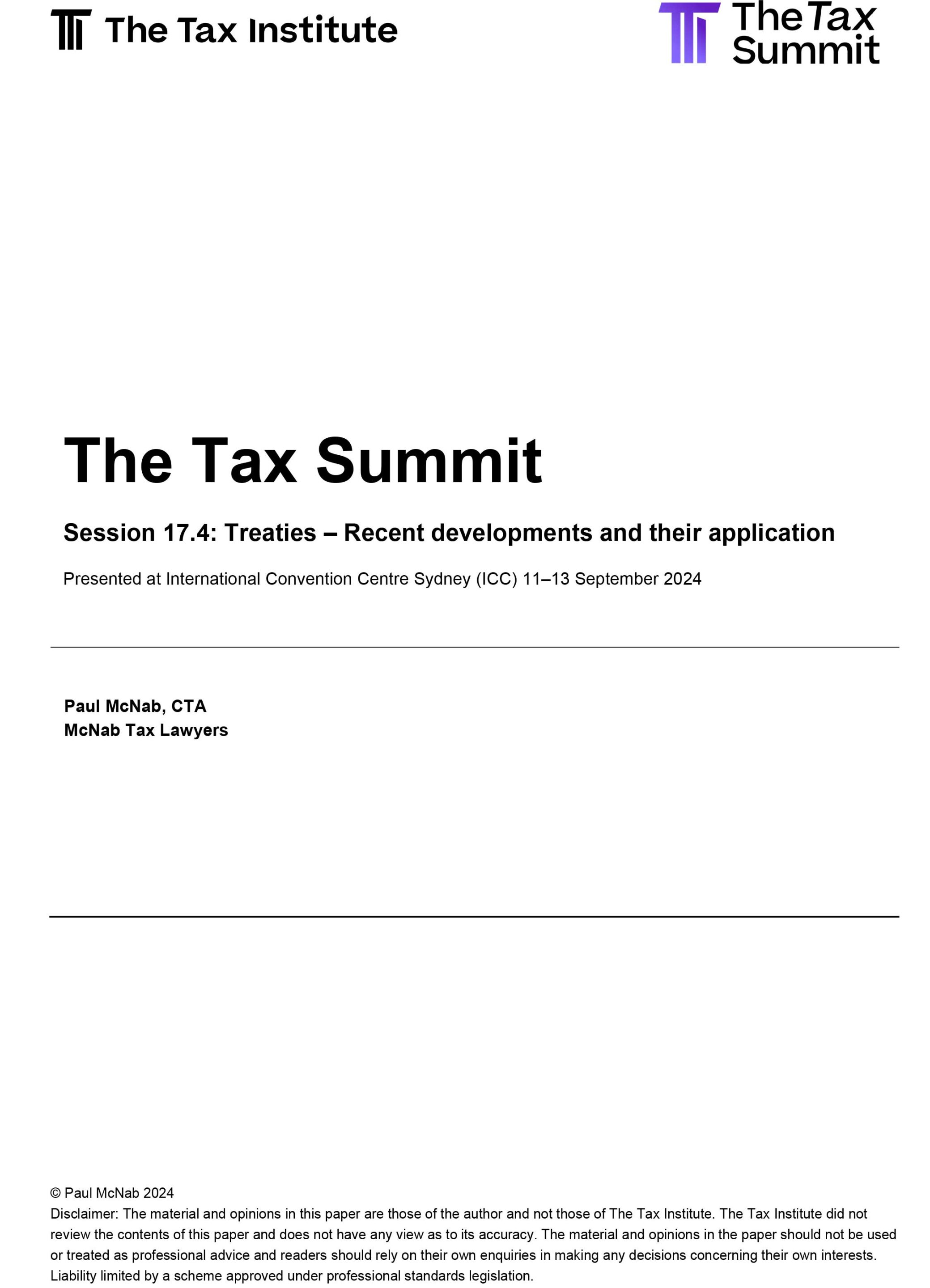Dive into a curated collection of articles and analyses, offering a deeper understanding of trends, challenges and opportunities in Australian taxation.
Insights
Insights
Dive into a curated collection of articles and analyses, offering a deeper understanding of trends, challenges and opportunities in Australian taxation.
The Tax Summit
Session 17.4: Treaties – Recent developments and their application
Presented at International Convention Centre Sydney (ICC) 11–13
Sep 2024
My submission: ATO draft ruling TR 2024/D1. Royalties – character of payments in respect of software and intellectual property rights.
Mar 2024
Thank you for the opportunity to discuss Draft Ruling, TR 2024/D1 (“the Draft”) and to comment on it. The Australian Taxation Office’s continued public engagement on such topics is to be commended. It is also reassuring to see elements of previous submissions reflected in this latest draft.
Good faith in domestic and international tax law
Sep 2023
The expression “good faith” is not unknown in Australian domestic law, but its occurrence and use appears to be significantly more limited than in jurisdictions that are not derived from English common law.
In domestic law the most relevant considerations of it occur in contract law, in administrative law and in some statute law. In contract law it is an aide to interpreting the behaviour of the parties when determining whether that behaviour complies with the terms of the agreement. In administrative law it informs the question of whether an administrator made an appropriate decision. In statute law it is given limited application in specific situations, which do not include taxation and do not directly inform how the concept might be relevant to taxation. The statutory uses are consistent with the previous two categories.
Tapped out on Treaties and TARP
Sep 2023
The Australian tax system uses a number of concepts to determine the nexus a taxpayer must have before they are liable to Australian tax on a particular fact pattern. Non-residents generally only need to consider the Australian tax consequences of Australian “sourced” income, or capital gains transactions where the asset is a direct or indirect interest in Australian real property or relates to a business carried on by the foreign resident, through a permanent establishment in Australia.
Australia generally tries to reserve the right, in its double tax treaties, to tax certain capital gains which are directly or indirectly attributable to real property or rights relating to real property. In addition, some treaties require a credit to be give for the tax paid in Australia. In some cases, the gain may be protected from Australian tax because it is business profits or “other” income and not attributable to a permanent establishment here.
Private rulings: are they worth it?
July 2022
This article seeks to describe a structured approach, with reference to the law and relevant decisions, which may be used when trying to decide whether it is worthwhile to apply for a private ruling. The framework suggested is that which is generally used in choosing consumer products. The article suggests that the decision must be made by reference to the taxpayer’s corporate attitude to tax risk, and the other approaches available for achieving
the desired level of certainty on the tax risk associated with a particular issue.
Depending on the circumstances, other approaches may be preferred. Rulings, however, offer an opportunity to understand the Commissioner’s reaction to
a situation and, through engagement, achieve a positive response. They require particular care in drafting, and care in the evaluation of the response.
Legal professional privilege in Australian tax: ATO attacks Mylan debt push down
June 2022
On the 22nd of June 2022, the ATO has released an updated version of its voluntary “protocol” for taxpayers who wish to claim legal professional privilege (LPP) when they are asked for certain documents. The ATO and professions have been working for at least 4 years to try to reduce disputes about whether legal professional privilege applies to documents sought by the ATO, especially those sought by statutory notices using coercive powers. It is believed the Law Council initially hoped that a joint protocol might be released, but the final document is that of the ATO.
The document is to be commended as helpful guidance, designed in consultation with the professions, which may avoid some disputes where the Commissioner pushes to see documents that a taxpayer says are privileged. It aims to explain to taxpayers the information which, the Commissioner says, may convince him that a claim is likely to be well founded, and convince him that disputing the claim is unlikely to be successful.
Australia: PepsiCo in diverted profits tax dispute
Apr 2022
On February 2 2022 PepsiCo filed appeals in the Australian Federal Court against DPT assessments raised by the Australian Taxation Office. The appeal concerns the 2018 and 2019 years.
The matter is significant for a number of reasons. It is the first time that a DPT dispute has gone to court in Australia, and likely represents one of, if not ‘the’, first time the DPT provisions have been used in Australia.
But it is also significant for the subject matter, the question of ‘royalty free’ use of intellectual property (IP). The court filings disclose a common toll manufacturing arrangement, where PepsiCo sold concentrate to Schweppes Australia (an arm’s-length unrelated party), who bottled drinks for the Australian market under direction of PepsiCo.
Legal Professional Privilege in Australian Tax Disputes: C of T v PwC
Apr 2022
Complex tax disputes (and tax risk issues in transactions) often arise in relation to cross border dealings. A critical part of understanding the risk is the ability to quickly and thoroughly gather the relevant evidence. It is common for the case theory to evolve as this is done, and the initial understanding of the evidence may prove to ultimately be quite incorrect. Managing this process though a well integrated global legal team enables taxpayers to ensure that their final representations to tax authorities are complete, accurate and well argued. And that initially gathered incomplete or inaccurate information, gathered by the legal team under privilege, cannot be forcibly obtained.
Australian Federal Court Judgment Against Singtel In Transfer Pricing Dispute
Jan 2022
On Dec. 17, 2021 the Federal Court of Australia delivered judgment against Singapore Telecom Australia Investments Pty Ltd (STAI) ([2021] FCA 1597), the taxpayer in a transfer pricing dispute against the Australian Taxation Office (ATO). That was the last official sitting day for the Court in 2021 and it will officially commence sittings again Jan. 31, 2022. December and January are generally a lengthy holiday period in Australia.
Counsel and the taxpayer in this matter, however, now have 28 days to file any appeal. The entire hearing, including joint examinations of overseas witnesses, was conducted over Microsoft Teams and with an electronic court book.
The entities in these transactions are all subsidiaries of Singapore Telecommunication Ltd (Singtel), a Singapore resident listed company.
Australia: Privacy of corporate taxpayer information in the Australian tax system
Dec 2021
Multinational enterprises often possess commercially sensitive information, the public disclosure of which could damage them competitively. This may range from contract terms to client names. Often this information is specific to a particular jurisdiction, or even more commonly said to not be directly relevant to a particular jurisdiction. The Australian Taxation Office (ATO), however, often demands global information from groups when reviewing the operations of their Australian entities.
Many groups are reluctant to share data that does not directly relate to Australia with the ATO, and this creates difficult relationship issues for the parties. The rights and ability of the ATO to coercively gather such information will not be considered. Strategies that might be adopted by the parties to resolve disputes over such access to information where they arise will also not be considered.
INSIGHT: Australian Tax Office Appeals ‘Glencore’ Transfer Pricing Decision
May 2020
The Australian Tax Office is appealing Glencore Investment Pty. Ltd.’s September 2019 transfer pricing victory in the Federal Court of Australia. The decision was significant in part because there is little transfer pricing case law in Australia, says Paul McNab of DLA Piper. The author explains the importance of the decision and the ATO’s (last-minute) appeal.
This year we will see further litigation in Australia concerning the operation of our transfer pricing rules. The appeal in the Glencore dispute, in particular, is likely to be heard by the
Full Federal Court in its sittings Aug. 3-28, 2020.
The dispute in this matter has already taken some unusual turns.
Could an Australian APA be enforced in a court?
Apr 2014
An advance pricing arrangement (APA) is generally an arrangement between a taxpayer, the Australian Taxation Office (ATO) and sometimes also a foreign tax authority regarding the income tax treatment of international transactions, agreements or arrangements between related parties or associates. Advance pricing arrangements often represent a compromise between the taxpayer and the ATO where a dispute is resolved by execution of an APA in relation to future years (sometimes bilaterally). Since an APA is a compromise and deals with future years, the outcome may differ from that which would result under arm’s length conditions. Taxpayers who wish to enforce such agreements against the ATO will find it difficult to do so through court processes. Disputes over APAs are currently resolved by administrative means, importantly including mutual agreement procedure. This article considers whether taxpayers or the Commissioner of Taxation might also be able to bring such disputes before a court.
The High Court’s approach to taxation special leave applications
Feb 2012
The process of special leave applications
What are special leave applications and how do they begin?
Litigation may come before the High Court of Australia either in the court’s original jurisdiction (pursuant to ss 73 and 76 of the Constitution), or the court’s appellate jurisdiction (pursuant to s 73 of the Constitution). Due to the nature of taxation cases, they primarily come before the High Court in the latter jurisdiction.
Unlike original jurisdiction, the High Court’s appellate jurisdiction does not allow appeals as of right. It is a discretionary jurisdiction, and special leave must be obtained from the High Court to appeal a case to the full bench. Applications for special leave are dealt with under r 41 of the High Court Rules 2004 (Cth) (HCR).

